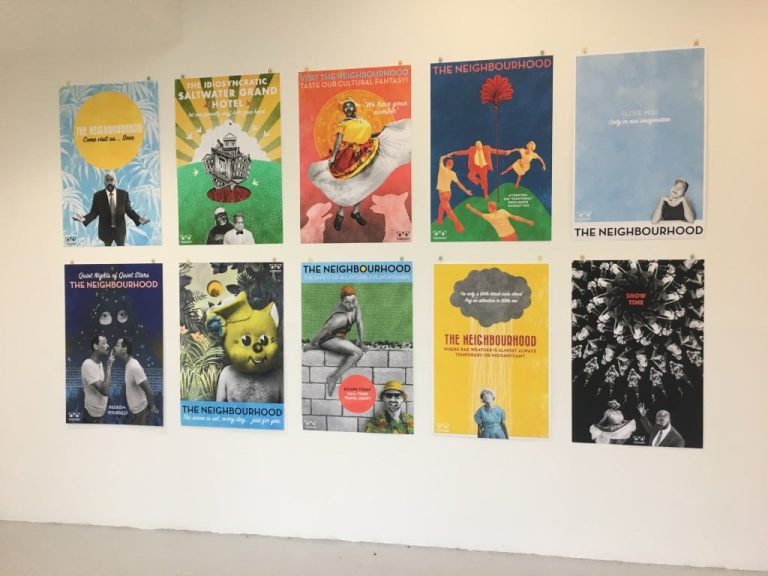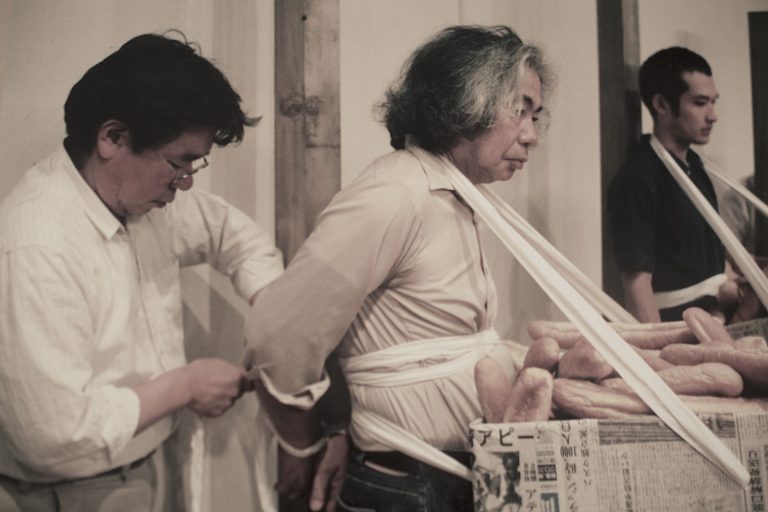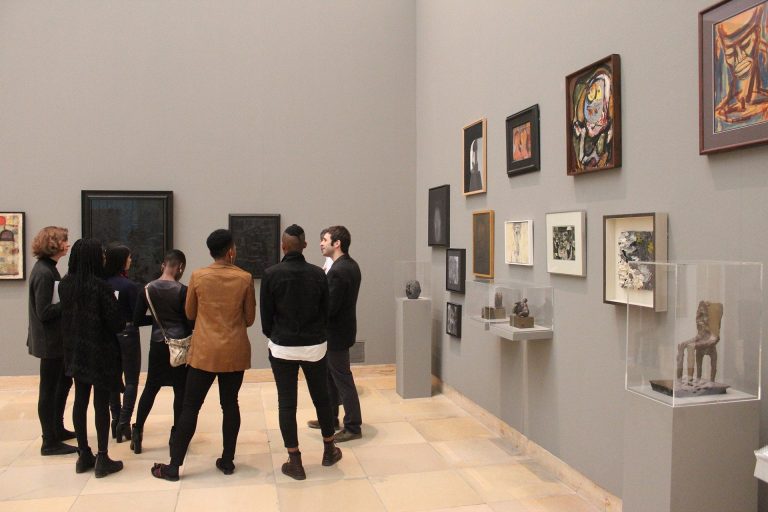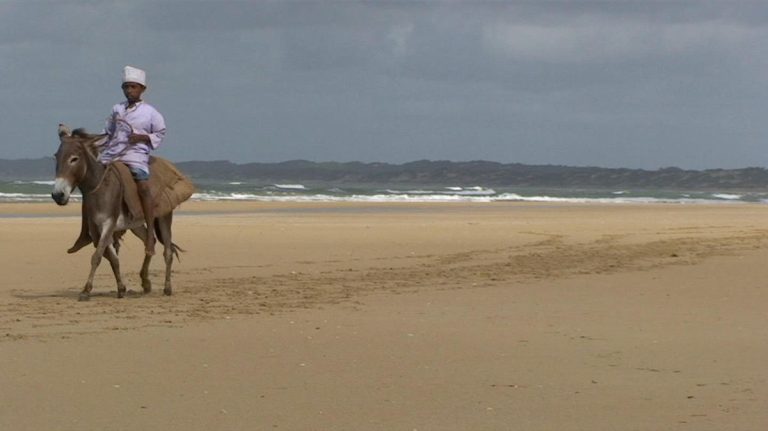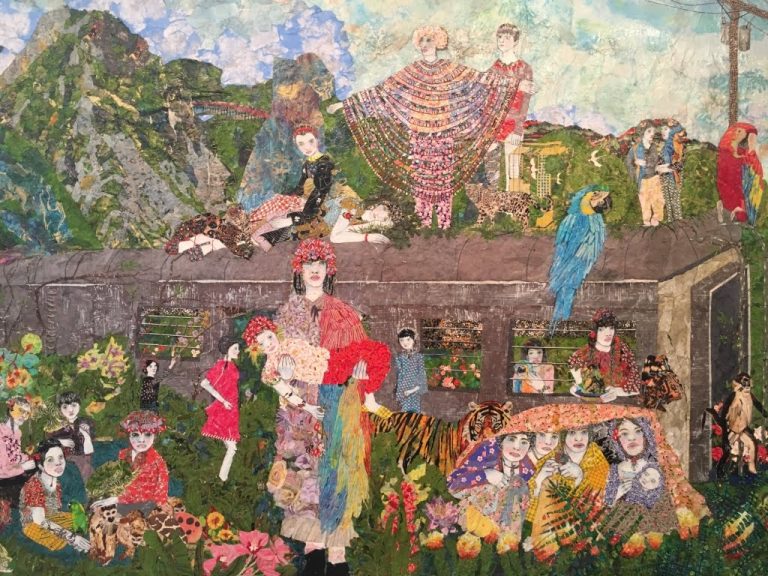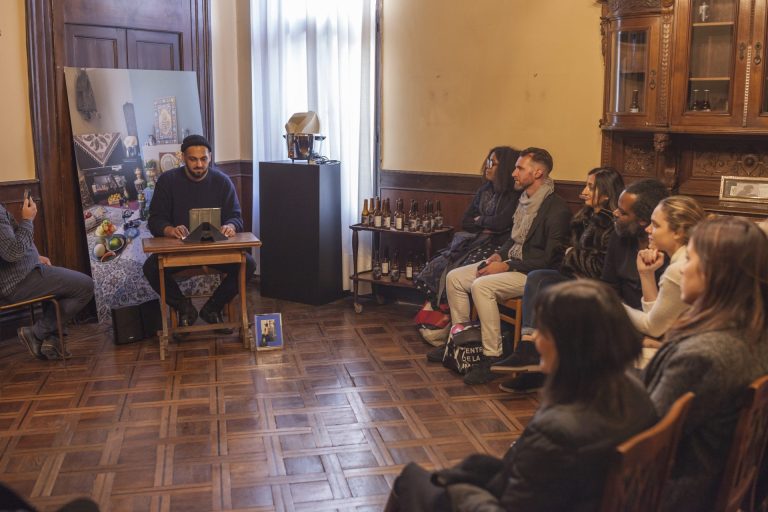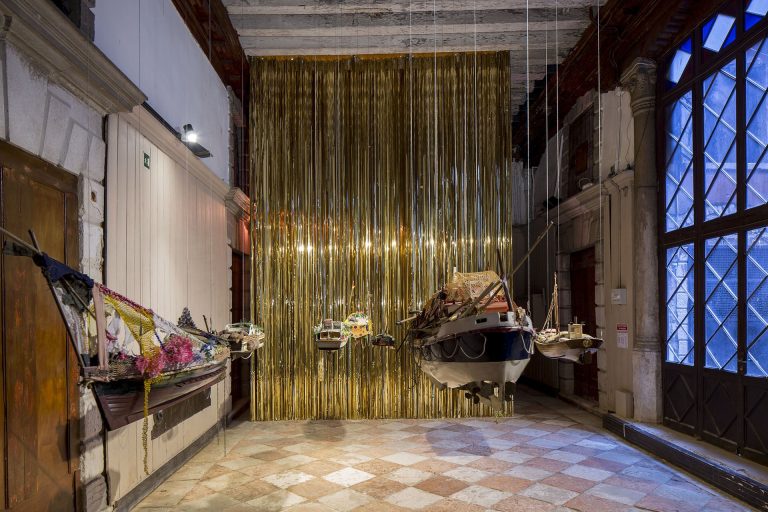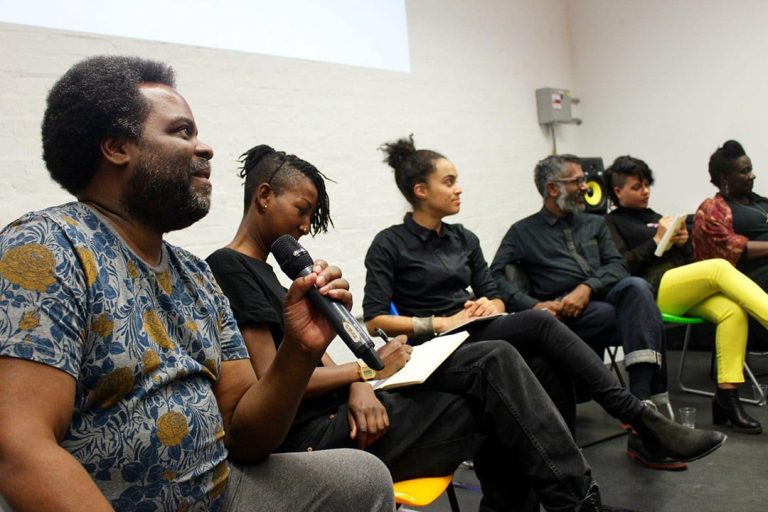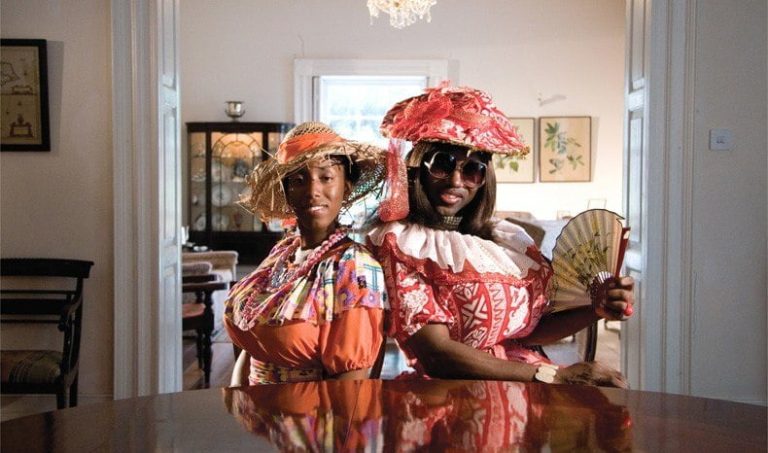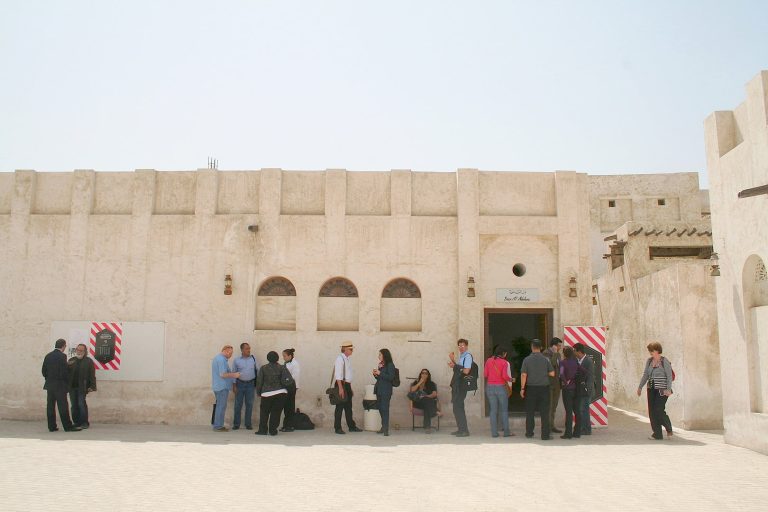Is the Curator an Agent or Double Agent of Cultural Identity? (Symposium)
Curating the International Diaspora Gwangju symposium (2016)
Curating the International Diaspora Gwangju symposium (2016)
Dates:
1 Sep 2016 - 2 Sep 2016
People:
Jeonhwan Cho, Jaewon Choi, Judith Greer, Hyejin Han, Melanie Keen, Alexandra MacGilp, Graeme Evelyn Mortimer, Yongsung Paik, Kyong Park, Hoor Al Qasimi, Sara Raza, JW Stella, Mark Waugh, Jian Jun Xi. View 9 more
Location:
Asia Culture Centre, Gwangju, South Korea
Project:
Is the Curator an Agent or Double Agent of Cultural Identity? was a symposium which investigated how emergent cultural diasporas have impacted the curatorship of contemporary visual arts specifically and how new models of contemporary curating have developed as a consequence of these effects. The programme sought to demonstrate how curatorial practice has been radically transformed by the diaspora of people, intellectuals, artists, and cultural workers.
The symposium was part of ICF’s Curating the International Diaspora programme (2016-7), which was a trans-national, multi-site project that involved working with curators and artists from culturally diverse backgrounds across five countries with a range of cultural partners in London, UK; Gwangju, South Korea; Barbados & Martinique, the Caribbean; Sharjah, UAE.
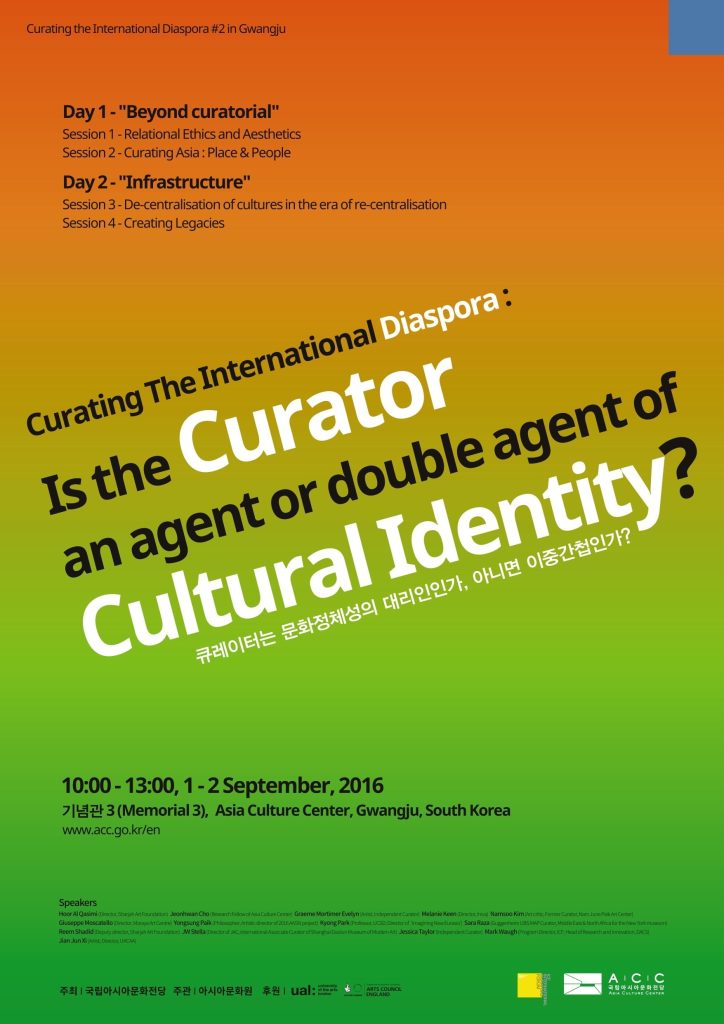
For intellectual and cultural diasporas from diverse origins and disciplines, a new kind of curatorial practice has attempted to represent these changes by creating what Ute Meta Bauer has called ‘a space of refuge – an in-between space of transition and of diasporic passage’ for cultural workers across the world.
Whereas increased global mobilities, displacement, and the vast emigration of cultural producers has had a profound effect on contemporary art and curatorial practice for the last three decades, focused research has not been conducted on the impact of these developments.
Similarly, little attempt has been made to understand how curatorial practice in Asia has been influenced by cross-cultural diasporas or how the emergence of a more globalised art world has taken account of these new networks, flows and their dispersal, which increasingly operate at an international, trans-national, multi-national and global level, with the local and global in constant dialogue with one another.
Issues of cultural identity and representation are highly debated topics at the moment. In the current geopolitical and economic circumstances, the world is increasingly facing the rise of ‘nationalism’ as a dominant discourse, often justified as a sense of self-protection of ‘the people’ under an assumed homogenous collective identity against the heterogeneous ‘otherness’. There is growing concern in the international artistic community about censorship and the closing down of public opportunities to engage with international cultures, despite increasing globalization of cultural flows and practices, facilitated by the advent of digital technologies, social media platforms, and the increasing circulation of products and populations.
In celebration of it’s inauguration of the new Asia Culture Centre in Gwangju, South Korea, this symposium – which was curated by JW Stella and Mark Waugh – aimed to explore the role of curatorial practice and art institutions of Asia in questioning the very notion of (collective) identity and creating a critical space for cultural cross-pollination and encounters within the current geopolitical context.
After the symposium, the group visited the 2016 Gwangju Biennial entitled The Eighth Climate: What Does Art Do curated by Maria Lind, and then traveled to Seoul to visit the Seoul International Media Art Biennale and MMCA Seoul.
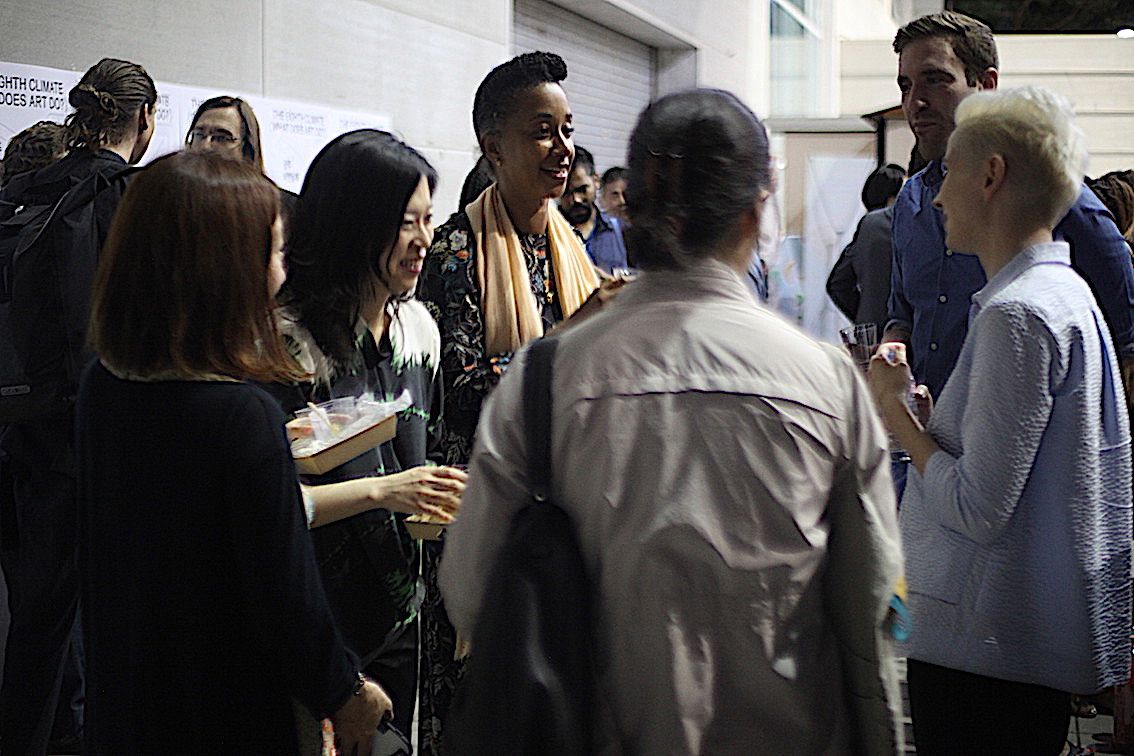
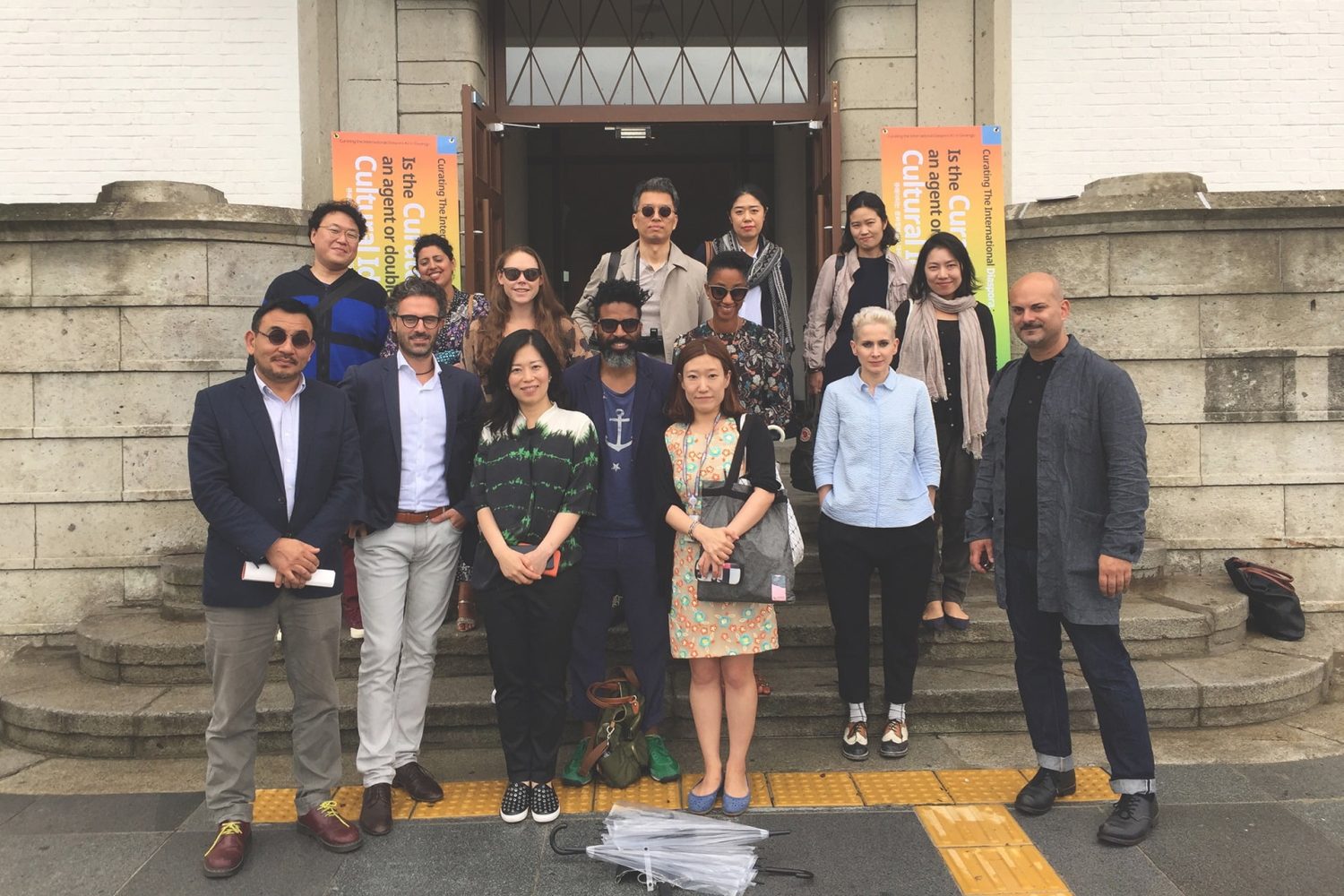
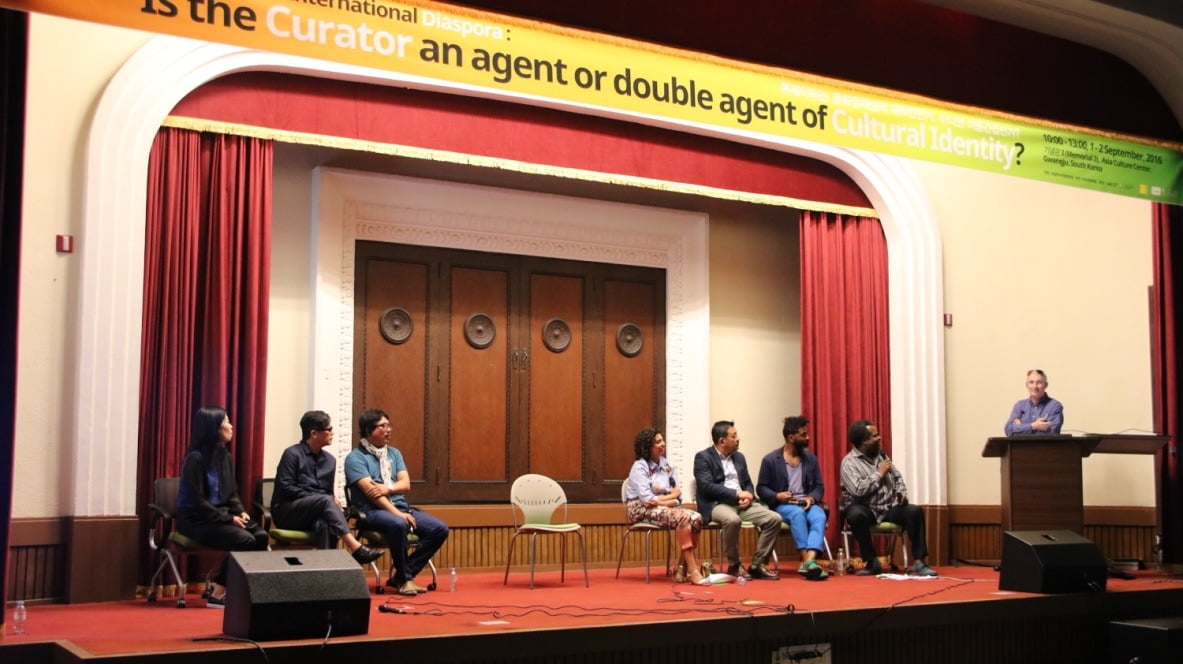
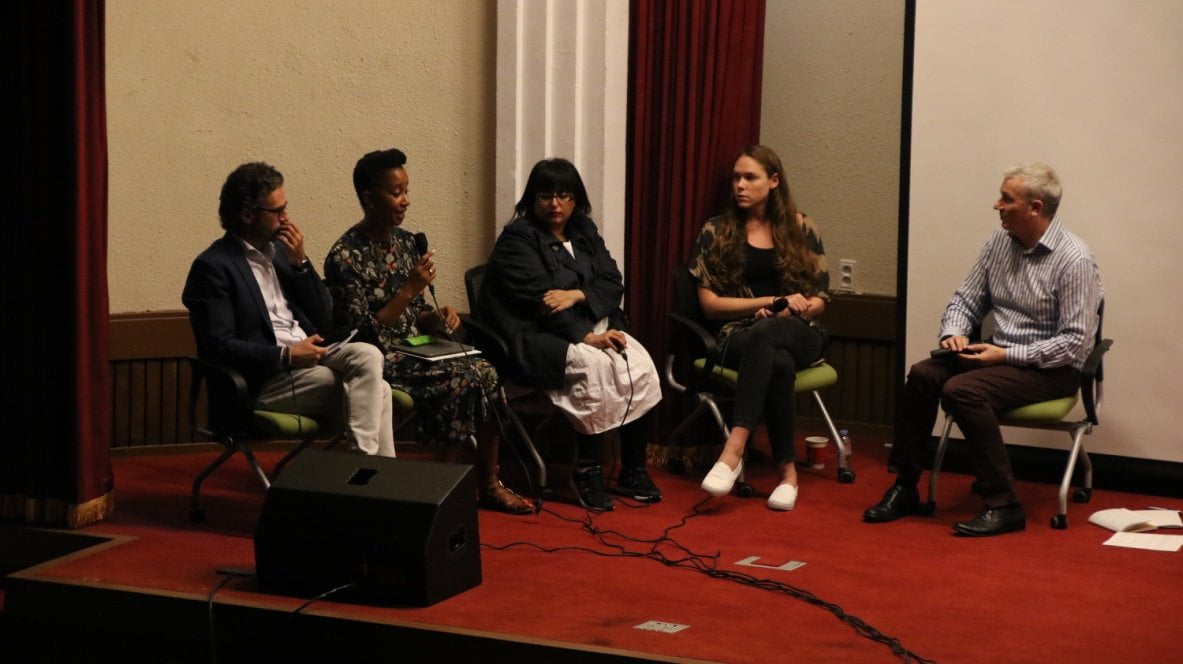


Curating the International Diaspora Gwangju symposium participants (2016)
SYMPOSIUM PROGRAMME
Day 1. Beyond Curatorial
Session1: Relational Ethics and Aesthetics
Session 2: Curating Asia: place & people
Invited speakers (both from Pan Asian diaspora in the West and Western diaspora in the East) will share their recent practice as a framework to address the questions:
• How does a curator, as primary interpreter of a work of art and collaborator with the artist ‘de-construct’ discourses of homogenised stereotypes of cultural identity?
• How are radical approaches to curatorial research enabling new versions of movements in Asia since their various moments of Modernism/ modernity.
Day 2. Infrastructure
Session 3: De-centerialisation of cultures in the era of re-centralisation.
Session 4: Creating Legacies
These questions are raised in remembrance of the late consideration of hospitality as defined by the Algerian – French diaspora philosopher Jacques Derrida. “The law of unlimited hospitality and on the other hand, the laws (in the plural), those rights and duties that are always conditioned and conditional by all of law and all philosophy of law up to Kant and Hegel in particular, across the family, civil society, and the State of Hospitality”. (Stanford Press 2000)
Our speakers from the independent groups and the public institutions in Pan-Asia will illuminate the issue of curatorial agency by discussing
• the roles of art and cultural institutions as cultural facilitators and how they can re-position themselves in the current geopolitical climate.
• how will the new Asia Culture Center establish new Asian cultural identities through the form of contemporary art practice.
People:
Jeonhwan Cho, Jaewon Choi, Judith Greer, Hyejin Han, Melanie Keen, Alexandra MacGilp, Graeme Evelyn Mortimer, Yongsung Paik, Kyong Park, Hoor Al Qasimi, Sara Raza, JW Stella, Mark Waugh, Jian Jun Xi. View 9 more
Project:
Is the Curator an Agent or Double Agent of Cultural Identity? was a symposium which investigated how emergent cultural diasporas have impacted the curatorship of contemporary visual arts specifically and how new models of contemporary curating have developed as a consequence of these effects. The programme sought to demonstrate how curatorial practice has been radically transformed by the diaspora of people, intellectuals, artists, and cultural workers.
The symposium was part of ICF’s Curating the International Diaspora programme (2016-7), which was a trans-national, multi-site project that involved working with curators and artists from culturally diverse backgrounds across five countries with a range of cultural partners in London, UK; Gwangju, South Korea; Barbados & Martinique, the Caribbean; Sharjah, UAE.

For intellectual and cultural diasporas from diverse origins and disciplines, a new kind of curatorial practice has attempted to represent these changes by creating what Ute Meta Bauer has called ‘a space of refuge – an in-between space of transition and of diasporic passage’ for cultural workers across the world.
Whereas increased global mobilities, displacement, and the vast emigration of cultural producers has had a profound effect on contemporary art and curatorial practice for the last three decades, focused research has not been conducted on the impact of these developments.
Similarly, little attempt has been made to understand how curatorial practice in Asia has been influenced by cross-cultural diasporas or how the emergence of a more globalised art world has taken account of these new networks, flows and their dispersal, which increasingly operate at an international, trans-national, multi-national and global level, with the local and global in constant dialogue with one another.
Issues of cultural identity and representation are highly debated topics at the moment. In the current geopolitical and economic circumstances, the world is increasingly facing the rise of ‘nationalism’ as a dominant discourse, often justified as a sense of self-protection of ‘the people’ under an assumed homogenous collective identity against the heterogeneous ‘otherness’. There is growing concern in the international artistic community about censorship and the closing down of public opportunities to engage with international cultures, despite increasing globalization of cultural flows and practices, facilitated by the advent of digital technologies, social media platforms, and the increasing circulation of products and populations.
In celebration of it’s inauguration of the new Asia Culture Centre in Gwangju, South Korea, this symposium – which was curated by JW Stella and Mark Waugh – aimed to explore the role of curatorial practice and art institutions of Asia in questioning the very notion of (collective) identity and creating a critical space for cultural cross-pollination and encounters within the current geopolitical context.
After the symposium, the group visited the 2016 Gwangju Biennial entitled The Eighth Climate: What Does Art Do curated by Maria Lind, and then traveled to Seoul to visit the Seoul International Media Art Biennale and MMCA Seoul.






Curating the International Diaspora Gwangju symposium participants (2016)
SYMPOSIUM PROGRAMME
Day 1. Beyond Curatorial
Session1: Relational Ethics and Aesthetics
Session 2: Curating Asia: place & people
Invited speakers (both from Pan Asian diaspora in the West and Western diaspora in the East) will share their recent practice as a framework to address the questions:
• How does a curator, as primary interpreter of a work of art and collaborator with the artist ‘de-construct’ discourses of homogenised stereotypes of cultural identity?
• How are radical approaches to curatorial research enabling new versions of movements in Asia since their various moments of Modernism/ modernity.
Day 2. Infrastructure
Session 3: De-centerialisation of cultures in the era of re-centralisation.
Session 4: Creating Legacies
These questions are raised in remembrance of the late consideration of hospitality as defined by the Algerian – French diaspora philosopher Jacques Derrida. “The law of unlimited hospitality and on the other hand, the laws (in the plural), those rights and duties that are always conditioned and conditional by all of law and all philosophy of law up to Kant and Hegel in particular, across the family, civil society, and the State of Hospitality”. (Stanford Press 2000)
Our speakers from the independent groups and the public institutions in Pan-Asia will illuminate the issue of curatorial agency by discussing
• the roles of art and cultural institutions as cultural facilitators and how they can re-position themselves in the current geopolitical climate.
• how will the new Asia Culture Center establish new Asian cultural identities through the form of contemporary art practice.
Dates:
1 Sep 2016 - 2 Sep 2016
Location:
Asia Culture Centre, Gwangju, South Korea


